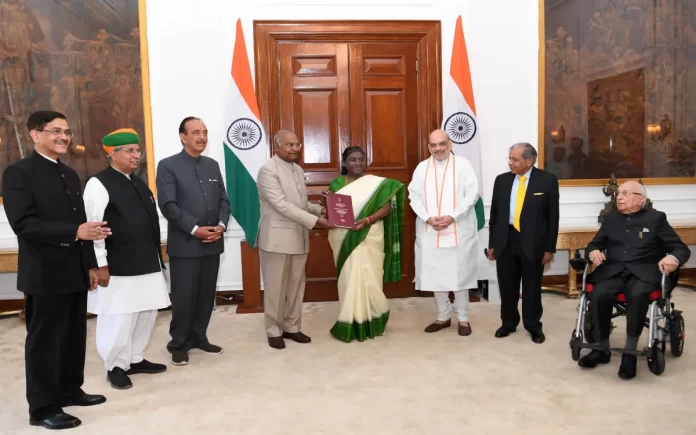New Delhi: In a significant stride towards electoral reform, the committee spearheading the ‘One Nation, One Election’ initiative, led by former President Ram Nath Kovind, presented its comprehensive report to President Droupadi Murmu on Thursday. Emphasizing the necessity of electoral simultaneity, the report advocates consolidating multiple elections to mitigate disruptions and enhance socio-economic stability.
The High-Level Committee on Simultaneous Elections convened at Rashtrapati Bhavan to deliver its exhaustive report, spanning an impressive 18,626 pages. This culmination of extensive consultations, expert opinions, and 191 days of rigorous research since its inception on September 2, 2023, underscores the gravity of the proposed reforms.
Presenting the report were esteemed members of the committee, including Union Home Minister Amit Shah, Union Law Minister Arjun Ram Meghwal, and Democratic Progressive Azad Party (DPAP) chief Gulam Nabi Azad, among others. The collective effort of these individuals reflects a broad consensus on the imperative need for electoral streamlining.
Recent deliberations of the High-Level Committee involved comprehensive engagements with representatives from diverse political entities such as BJP, Trinamool Congress, Samajwadi Party, CPI, CPI(M), AIMIM, RPI, and Apna Dal. These interactions facilitated a thorough exchange of ideas, with participating parties submitting their recommendations in writing to the committee.
In a concerted effort to engage the public, the committee also solicited public opinion on the ‘One Nation, One Election’ paradigm. A public notice inviting suggestions from the general populace emphasized the commitment to incorporate diverse perspectives in shaping the electoral landscape.
The genesis of this initiative dates back to September when the central government established the High-Level Committee to address the complexities surrounding simultaneous elections and propose actionable recommendations for nationwide implementation.
The current electoral framework is marred by incessant elections across various states and levels of governance, consuming substantial time and resources. With elections occurring almost year-round, ranging from local bodies to panchayats, the need for consolidation is apparent.
However, transitioning to a unified electoral model necessitates multifaceted reforms, encompassing the standardization of electoral rolls and amendments to existing laws and the Constitution. The roadmap outlined in the recommendations provides a strategic blueprint for navigating these transformative changes.
A pivotal aspect of this transition will involve recalibrating the tenure of legislative assemblies to synchronize elections with the national schedule. This endeavor, while inherently challenging, underscores the government’s commitment to institutional reform and democratic consolidation.
As the government meticulously analyzes the report, legislative changes and administrative adjustments will pave the way for the realization of the ‘One Nation, One Election’ vision, heralding a new era of electoral efficiency and governance cohesion.



